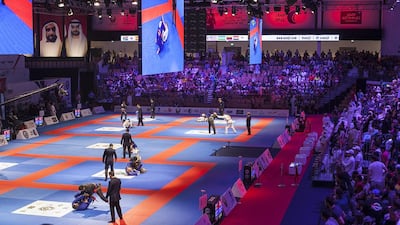Whether you consume sports news through newspapers, television or even outdoor billboards, chances are you have noticed the combat sport of Brazilian ju-jitsu in Abu Dhabi.
Ju-jitsu is not solely a martial art; it is a sport that promotes physical fitness, mental strength and building character in youth and, ultimately, it is a way of life.
Ju-jitsu is a grappling system in which participants use technique and leverage to subvert strength and, most importantly, force the fight to the ground by way of chokes and joint locks. It has become the fastest-growing martial art over the past two decades and an important influence in mixed martial arts.
In the past few years, ju-jitsu has become an official government project in Abu Dhabi, advocated by members of the Royal family and led forward passionately by Sheikh Tahnoon bin Zayed, an advocate of the sport and a professional ju-jitsu athlete.
Sheikh Tahnoon fell in love with ju-jitsu during the first Ultimate Fighting Championship, held in the US city of Denver in 1993. By 1998, he established the Abu Dhabi Combat Club (ADCC), a competition circuit that has epitomised the art of submission combat.
The ADCC has turned Abu Dhabi and UAE into the capital of Brazilian ju-jitsu, and in 2012 the UAE Jiu-Jitsu Federation was established as the official authority for the sport in the UAE.
The federation’s flagship competition, the Abu Dhabi World Professional Jiu-Jitsu Championship, is staged every April and is known for paying its winners the highest monetary prizes of any ju-jitsu competition.
Last month, the UAE federation announced the launch of the Abu Dhabi Grand Slam, with tournaments to be staged in four major cities — Tokyo (last month), Los Angeles, Rio de Janeiro and London. It is a competition funded and sponsored by Abu Dhabi to further globalise and monetise the sport around the world.
The Grand Slam comprises the ultimate test of a player’s toughness. Winning a championship suggests the same sort of year-round excellence conferred by the football’s Uefa Champions League or the athletics Diamond League.
Abu Dhabi has seeded the sport into the UAE’s educational curriculum to further enhance awareness among Emirati youth. In 2008, ju-jitsu was introduced into 14 schools; now, it is part of the curriculum in more than 100 schools. The nation’s ju-jitsu federation has established 15 official training centres and work is in progress to build seven more.
Nothing quite mirrors the rise of ju-jitsu in Abu Dhabi. A sport that seemed to be fading in popularity a decade ago with little commercial relevance, at the time, has Abu Dhabi to thank for reviving it and taking it on a quest to be one of the most popular combat sports in the world.
The Jiu-Jitsu Asian Union (JJAU) was set up last year and is headed by two Emiratis: Fahad Ali Al Shamsi, chief executive of the UAE federation, and Abdulmonem Al Hashmi, the president of JJAU.
The JJAU Union is set to oversee its first Asian Jiu-Jitsu IBJJF Championship in Tokyo next week. The sport has also been granted a place in the 2018 Asian Games at Jakarta.
The next step, and the avowed goal of local supporters of the sport, is to get ju-jitsu onto the Olympics programme. Sheikh Tahnoon’s master plan is to make the sport so popular, commercially, that it cannot be ignored by the International Olympics Committee.
Ju-jitsu has introduced discipline among the Emirati pupils in schools, given a platform to thousands of athletes around the world to showcase their talent for a sport which used to be only a way of life.
Now, Abu Dhabi’s commercialisation of the sport has added value and purpose to it.
Thanks to ADCC and the UAE federation, Emiratis have a sport, in ju-jitsu, they can call one of their own.
FOLLOW US ON TWITTER @NatSportUAE

